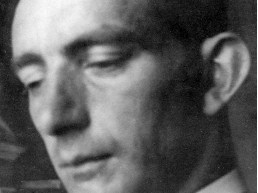Johannes Prassek
Resume in keywords
1911
- August 13, 1911: Johannes Prassek is born in 69 Grindelhof, Hamburg. The Grindel quarter is then the center of jewish life in the Hanseatic City of Hamburg. Prassek’s Lutheran mother Marie Hartmann works there as a housemaid, his father is bricklayer Johannes Prassek Sr. from the workers' housing area of Hamburg-Barmbek. The child is named Johann Heinrich Wilhelm. His mother returns with him in her hometown Hagenow in Mecklenburg.
1912
- February 25, 1912: Johannes Prassek is baptized a Lutheran in the Hagenow parish church.
- June 19, 1912: The parents marry and move together in 8 Gerstenkamp, Hamburg-Barmbek.
- September 13, 1912: Johannes Prassek receives a second baptism in the Catholic parish church of St. Sophien in Hamburg-Barmbek, namely sub conditione in case his lutheran baptism is deemed invalid. A re-baptism is thus avoided.
1917
- February 22, 1917: In the so called „rutabaga (neep turnip) winter“ hunger unrests break out in Hamburg-Barmbek. Bread shops are looted. A soup kitchen is opened in St. Sophien parish. Johannes Prassek is five years old.
1918
- Eastern 1918: Prassek starts school at the Catholic primary school in Elsastraße, Hamburg-Barmbek, run by the Sisters of Saint Elizabeth (“Grey Nuns”).
1921
- June 19, 1921: Prassek recieves the First Communion at St. Sophien.
1922
- Prassek starts his time at the Catholic secondary school (“Progymnasium”), 3 Alsterufer in Hamburg.
- Vicar Aloys Boecker in St. Sophien supports Johannes Prassek, who becomes an altar boy.
1923
- June 18, 1923: Prassek is confirmed by the bishop of Osnabrück Wilhelm Berning at St. Ansgar, Hamburg-Neustadt (also called Little St. Michael’s).
1925
- Aloys Boecker becomes pastor in Hamburg-Rahlstedt and rector in the Wilhelmstift (then a women’s asylum, later and also today a children’s hospital). He schedules Prassek as an altar boy and introduces him to the MSC Sisters (Missionary Sisters of the Most Sacred Heart of Jesus) working there. In 1935, Boecker, meanwhile Pastor in Heide, is beaten up by the SA. He dies in Hollage in 1941.
1927
- 1927: Prassek changes from secondary school to “Humanistisches Gymnasium Johanneum” (a high school with classical languages as required subjects) in Hamburg-Winterhude.
1931
- February 9, 1931: Prassek passes the Abitur (a-level exam) with excellent marks.
- April 1931: Prassek starts his degree in Catholic Theology at philosophical-theological College St. Georgen in Frankfurt/Main.
- October 1931: Prassek’s father is long since unemployed, like many people, finds the family in financial difficulties. His mother finds private loans for her son. The biggest amount – 3,000 Reichsmark – is lent by Anna Ostarek, a tradeswoman from Altona near Hamburg and friend of the family. This amount equates to about 20,000 Euros today.
1933
- May 1933: Prassek continues his studies in Münster and lives at 84 Hammer Straße. He joins the Catholic student association Unitas Ruhrania.
1934
- Prassek’s professor of ecclesiastical history is forcibly superannuated for refusing to use the Hitler salute. Münster’s Bishop Graf von Galen condemns the Neopaganism of the National Socialists in his diocesan’s Official Journal.
1935
- Summer 1935: Move to the seminary in Osnabrück.
- August 1935: Prassek’s mother dies from cancer in Catholic Marien-Hospital in Hamburg. One year before, Prassek’s older sister Emma died there from tuberculosis.
1937
- March 13, 1937: Ordination to the priesthood in Osnabrück’s cathedral by Bishop Wilhelm Berning.
- 1937: Prassek celebrates his First Mass as a newly-ordained priest in Osnabrück-Haste. A dear friend’s parents’ house in the village is the reason for celebrating there.
- April 4, 1937: First Mass in his hometown church Heilig Kreuz, Hamburg-Volksdorf. The MSC Sisters present him with a chasuble. This old church was replaced by a newly built one in 1965.
- March 23, 1937: First temporary ministry in Wittenburg/Mecklenburg. He gives lessons in religious education and celebrates masses. He makes a deep impression on the parish and is watched by the Gestapo secret police. The construction of the Reichsautobahn highway brings migratory workers from Poland to the diaspora in Mecklenburg; Prassek provides pastoral care and tries to communicate in their mother tongue.
1939
- March 25, 1939: Prassek takes up his ministry as an adjunct at Herz Jesu church in Lübeck, later he becomes First Chaplain. His tasks are the pastoral care of women and soldiers. He gives lessons in religious education again, mainly at secondary schools, and he meets with the pupils for discussion evenings in the presbytery. As a charismatic minister he is very liked. He organises food ration cards and clothing for the Polish forced laborers and provides pastoral care. He already learned Polish in the seminary.
1942
- May 15, 1942: For his active help after an air raid on Lübeck in March 1942, the Luftschutz-Ehrenabzeichen Stufe II (badge of honour for air-raid protection grade II) is awarded to Prassek.
Continuation at History compact
English translation: Sebastian Fiebig









